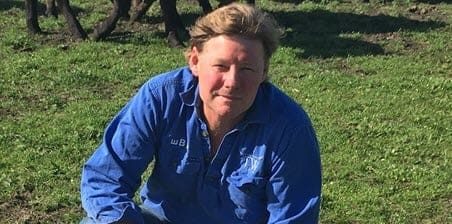
- WAFarmers Livestock Council president Geoff Pearson: uncertainty is impacting investment.
UNCERTAINTY around the Federal Government’s proposed live sheep export by sea phaseout timetable is impacting investment just as new sheep and cattle markets are emerging.
Minister for Agriculture Fisheries and Forestry Murray Watt disappointed Western Australian sheep and live export industry representatives at a short meeting in Perth on Monday, offering no insights into a release date for a phaseout panel report or a timetable for winding the trade down.
WA Livestock Exporters Association vice chairman Ashley James said exporters can’t make decisions on vessel refurbishment or replacement, and lotfeeders and exporters are ‘in limbo’ on facility upgrades and machinery purchasing.
“We’ve got Middle Eastern clients who want our sheep, exporters want to supply and farmers want new markets.”
Mr James said new health certificate protocols for three sheep and cattle markets were currently being negotiated with the Federal Government – in Morocco, Iraq and Iran.
“There is some political instability with Iraq and Iran, Morocco could open up but the protocol is stuck with Australian Government and hasn’t really moved too far forward.
“It’s a slow process between the governments, but from understanding the (Moroccan) documents are sitting with DAFF,” he said.
“I’ve spoken to the Moroccans and they’re waiting to get something back from the Australian Government.”
Morocco would be a new market for Australian sheep, and he expected it was prepared to take significant numbers of sheep.
“I think all three countries would like to take sheep as soon as possible, but obviously that would have to be before the moratorium starts (before June),” Mr James said.
“I would like to see exports in the first half of this year, but if protocols can’t be arranged then hopefully it will be in the back of 2024.”
Mr James said there are political aspects to exporting livestock to Iraq and Iran, but not to Morocco.
“There are no problems with Morocco, it is just getting both countries to agree on a health protocol.
“My understanding is that the Moroccans have sent Australia their requirements and they are waiting on feedback from the Australia Government.”
But he said supplying the countries would need in-country investments to meet Australia’s Exporter Supply Chain Assurance System requirements as well as securing supplies while more WA farmers get out of sheep.
“This is not exporters versus processors – exporters just want to open up another market that farmers can sell into.”
No commitments from Watt on livex phaseout report or timeline

Minister for Agriculture Murray Watt: no news for WA sheep and live export representatives.
Mr James said Mr Watt would not give any estimate on when the phaseout panel’s report would be released, even whether it would be one, two or three months away.
“I’m not sure we achieved too much, we wanted to know when this (phaseout) report will be out.
“The Minister said he wanted to see it as soon as possible but he can’t tell us when,” he said.
“I needs to go through Cabinet and then it needs to go to the budget committee because there will be money involved.
“We got nothing.”
WALEA and the farmer bodies at the meeting stated their positions that the Federal Government should reverse its policy to phase out live sheep exports by seas, but Mr Watt said “that won’t happen,” Mr James said.
“We’ll keep trying to convince them to reverse their decision.”
WAFarmers Livestock Council president Geoff Pearson said the meeting with Mr Watt was very disappointing.
“No outcomes, no answers; the usual questions asked, but no answers, it was frustrating.”
He said Mr Watt could not give any information about when the panel report will be released or a phaseout deadline, but restated to the Labor Government’s commitment to phase out the trade, but not in this term.
Mr Pearson said Mr Watt could not offer any assurances on the prospect of a further injunction against the import of the MV Bahijah’s shipment of sheep and cattle if the livestock were re-exported to Israel. Israeli animal welfare organisations brought an injunction against the importation of the vessel’s livestock after it was ordered back to Australia because of tensions in the Red Sea.
“As an industry we can’t be held at the mercy of left-wing minority organisations that disrupt markets and industry in agriculture,” Mr Pearson said.
“It (the meeting) was a waste of time.
“We can’t commit as an industry to exports until such time as we get some sort of outcome.”
Mr Pearson said a major concerns is that the government’s live export phaseout policy will become a precedent for government policy decisions that might affect other commodity sectors, such as glyphosate regulation for livestock farmers transitioning to cropping. Representations of WAFarmers, WALEA and the Pastoralists and Graziers Association of WA attended the meeting.



Typical minister against agriculture is at it again . World best practise is not rewarded as it should be .we need these markets for competition throughout australia .we also have worlds best practise for transporting these animals and our competition will service these markets with poorer Animal outcomes so the activists really don’t have a valid argument or the activists would be attacking the exporters with poorer animal health standards . We need something as Western Australia’s abbotior system is very poor and cannot handle the volumes needed for a sustainable sheep industry .ultimately this is affecting our local industry as eastern states abbotoirs are buying west Australian sheep for bugger all and it is distorting our local sales
The greenies and pen pushing government employees, need to be shown that the confitions on the ships are comfortable for the sheep.
Farmers also want to be sure the sheep are well looked after.
The government MUST NOT STOP THIS TRADE.
Get this story on the news and persuade Australians that farmers need this trade to continue.
I am a pastoral manager of 2 cattle stations, and I am disgusted in the way our overly WOKE government is handling anything. They only seem to act for the new woke activists who are hellbent on ruining the lives of Farmers and not on the people as a whole. We employ these people so isn’t it time we as the tax payer take back the reigns and sack them instead of sitting back whinging about it and then hiding under the doona?? Come on people, stand up to this wannabe of a government that is doing their best to dictate absolutely every aspect of our lives, including what commodity we use to cook our food…
I thought we were phasing out live export and yet the government is seeking new markets. I suggest we return to the abattoirs being built here in Australia Tempe Grande style which is kinder to animals and export the meat instead.
In WA they have a halal abattoir on the farmers property killing the animals, packaging and sending overseas.
We could build halal and kosha abattoirs here in Australia and send the meat. Much kinder and safer for the animals.
Obviously this government didn’t have any intention of reducing or stopping live export. Very disappointing.
The abattoirs in foreign countries have been a source of concern including Israel for cruelty and unsafe conditions for animals. In Indonesia hitting a cow on the head with a mallet many times was their procedure so many were skinned alive because they weren’t dead. Shocking and distressing. Let’s stop this archaic practise of live export.